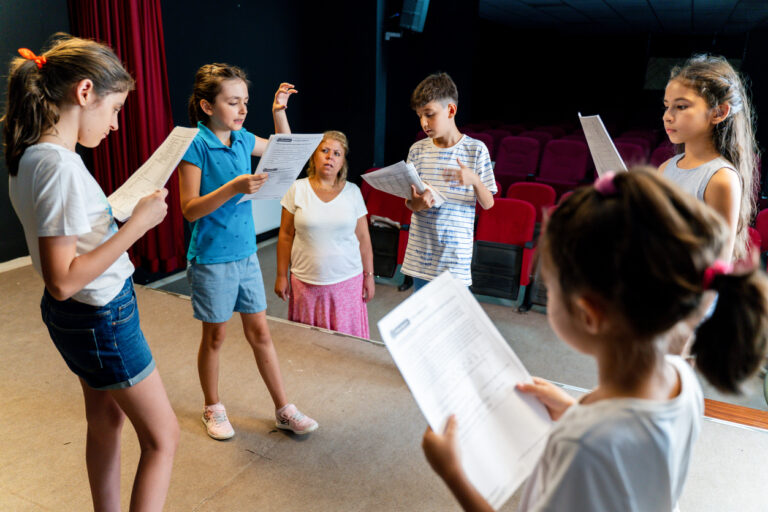As part of our Back to Basics series, I want to break down something actors get told to do a lot: research. We hear a lot about “actor’s homework” and “doing our research,” but what does that look like, practically?
The truth is that it can take many varied forms, according to the type of project, the time allotted and the materials available to you.
While research might require some creativity, it is an essential part of building a character. Here are some clues you can gather during your research and analysis that will deeply impact your performance.
Insights: Tips for Researching a Character
- Read and research the full script, unfamiliar words, and references to fully understand your character, story context and avoid mistakes in pronunciation or meaning.
- Analyze the setting, time period and socio-economic status to shape your character’s behavior, values, and motivations authentically.
- Determine the tone and study related works to quickly adapt your performance style to fit the project’s world and expectations.
Read the Source Material
Nothing beats full context. If you’re working on a scene and have access to the full script, read it all. The ability to dissect a script as a whole is an invaluable skill for an actor.
While your character won’t necessarily know their purpose in the world of the story, you as the actor must. Knowing how your character supports the story will help you zero in on the strongest choices for their objectives and tactics.
Look Up Unfamiliar Names, Words and References
Double-checking all names — even ones you think you know — is good practice. The number of words you know from reading, and haven’t said aloud, is probably higher than you think.
References are beautiful little clues to character, environment and stakes. They should never be ignored.
The more you fully understand the text you’re speaking, the richer and more nuanced your performance will be. At the very least, you won’t risk taking your audience out of it with a fumbled pronunciation or misunderstood reference.
Learn the Location of Your Character’s World
Understanding the setting of the scene is incredibly important. The effects of the environment in which the work is set are so much more far-reaching than one might assume.
Location is going to determine your character’s accent, upbringing, outlook, culture, status and values. Nearly everything about your character has some thread tied to the location. Whether they’re in a familiar location or not will determine their comfort level and confidence.
Think about your current location, and imagine yourself suddenly transported to Antarctica, Ukraine or the Bahamas. How many things are affected? How would your internal pace differ? What is your perception of peace vs. danger?
With a simple setting change, a ripple effect runs through your character’s stakes, emotional regulation, strategies for success, or survival. Missing this piece of context can have devastating effects on your scene work.
Thinking about joining Casting Networks? Sign up for a free trial today!
Research the Time Period Where Your Script Takes Place
Hand-in-hand with location, time period is another contextual mainstay that proper research must include. It cannot be stressed enough that this doesn’t just affect how your character speaks and dresses — it even affects the values they hold dear.
Think about Romeo and Juliet for example. When Juliet resists her family’s decision to marry her off to Paris, her father essentially threatens to disown her.
While potentially emotionally devastating in any time period, the consequences of this in the present-day United States vs. 14th-century Verona hold some key differences. Juliet’s reputation would have far more effect on her future back then than it would today. Her options would be fewer with the stakes much closer to life and death. An audience at that time would have understood the implications.
What is Your Character’s Socio-economic Status?
The third leg of this stool is the socio-economic status that your character holds.
Piggybacking on the previous example, Juliet was from a wealthy family — a family at war with another highly connected family. She was presumably brought up educated but without hard labor skills. Sheltered, but hyper-aware of the violence just outside her walls. All these things give vital context to her character, her decisions and the consequences of her actions.
Without knowing the time, place and socio-economic status of the characters in your scene, it is impossible to glean a full understanding of the stakes, motivations and impact of the story.
Determine the Tone of the Script
If you can pick up on tone quickly, you have one of the fastest hacks for auditions and scene work in your back pocket. When you don’t have access to the full script or time to analyze it, figuring out the tone of the work is the way to look like you belong in the world they’re trying to cast.
Tone can also sound nebulous, but it encompasses genre, pace, style of film-making, style of acting, the balance of comedy, and aesthetics. When you build a mental shorthand for different tones, you can place yourself quickly within the world of the script.
Look Up Other Works by the Same Director, Writers or Brand
If you can’t access the full script, this is a great way to try to ascertain what tone might be likely to be at play. This goes for everything from commercials to full-length features.
It’s not a fail-safe method, as writers, directors and even product marketing can produce works in a wide range of tones. But in a pinch, it can give you some handy insight.
All of this merely scratches the surface of what proper character and script research can uncover. Any time saved by rushing this portion of the actor’s process is not worth the sacrifice of performance depth.
This can be one of the most rewarding parts of the process. It’s an opportunity to sink into your character’s shoes and explore the many possibilities that circumstances can have on a character’s development.
You may also like:












